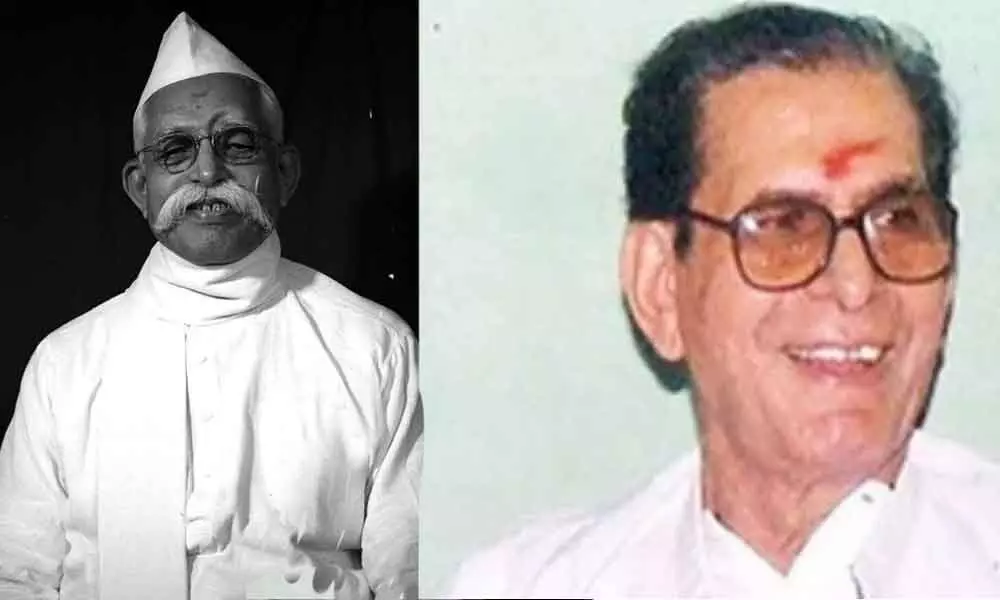Life and legacy of Madhya Pradesh's first leaders

Pandit Ravi Shankar Shukla,Shyama Charan Shukla
At the entrance to the Outer Lobby of Lok Sabha, on the left side, is placed the seven feet high bronze statue of Pandit Ravi Shankar Shukla. He was a legal luminary, an outstanding freedom fighter, a veteran leader, an able administrator and an accomplished parliamentarian.
At the entrance to the Outer Lobby of Lok Sabha, on the left side, is placed the seven feet high bronze statue of Pandit Ravi Shankar Shukla. He was a legal luminary, an outstanding freedom fighter, a veteran leader, an able administrator and an accomplished parliamentarian.
Pandit ji as he was popularly known was patriot who dedicated his life to the service of nation. He was also a member of the first constituent Assembly and the first chief minister of Madhya Pradesh. His name has become synonymous with the state of Madhya Pradesh.
He was a great administrator and had laid a strong foundation for the economic, political, social and cultural growth of the state in the reorganised Madhya Pradesh the biggest state of India consisting of Mahakoshal, Madhya Bharat, Bhopal and Vindhya Pradesh the first Chief Minister of Madhya Pradesh state from 26 January 1950 till his death on 31 December 1956.
He was a great lover of Hindi and was greatly influenced by Lokmanya Tilak and his views. Apart from being a politician, he was also a good speaker and writer and strived for promotion of Hindi language. The credit of establishing Bhilai Steel Plant, setting up of Sanskrit and Ayurveda, science and engineering colleges in Raipur shows his concern toward education. Another lesser known fact about Shuklaji is that he had played the leading role in the merger of Hyderabad into the Republic which Vallabhbhai Patel appreciated whole heartedly. He laid special emphasis on the upliftment of women. He was a staunch opponent of illiteracy, purdah and dowry system.
He was survived by six sons but of them the eldest one, Shyama Charan Shukla and Vidya Charan Shukla proved to be force to be reckoned with for decades in Madhya Pradesh politics. However, Shyama Charan later became the chief minister of Madhya Pradesh for three times. A law graduate with a stint in journalism Shayma Charan was elected to state assembly for six terms.
Shyama Charan was loyal to Indira Gandhi during power struggle in Madhya Pradesh. Indira Gandhi rewarded him by making him the chief minister in 1969 after Sanyukta Vidhayak Dal government of Govind Narain Singh fell. He got a second term during emergency and was in office for a little over year between 1975 and 1977.
Nicknamed 'Prince Charming', Shukla was known as a man who took pride in his dressing. He used to sport bandh gala and is known for his aristocratic life style. Shyama was known as a person who was steadfast and did not fear fighting for what he wanted. Not withstanding opposition from bureaucracy, with a stroke of pen he legalised all colonies in the state. He also got the amendment to the Prevention of Corrupt Practices Act, passed during a mini session of the state Assembly. His meetings with officials used to last till dawn.
He always had a tussle with another stalwart in MP politics Arjun Singh. Shyama Charan, could not find favour in Delhi with both the P V Narasimha Rao regime and the Sonia Gandhi-led Congress. His political sanyas was catalysed with Digvijaya Singh taking over as the Madhya Pradesh chief minister in 1993. His last shot at power was when Chhattisgarh became a separate state in 2000 which lasted for just three months.
Shukla had laboured hard to take Mahanadi's run-off waters to the paddy fields in Chattisgarh where 80 percent of the people depended on agriculture. Known as 'Shyama Bhaiya', those who worked with him say they cannot forget the warmth and affability with they were treated by him.














